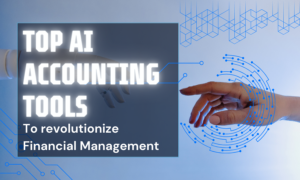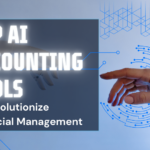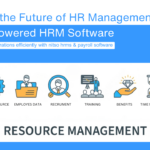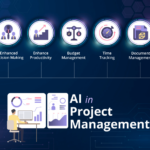Introduction
The financial landscape is undergoing a digital transformation, with artificial intelligence (AI) playing a crucial role in automating and optimizing financial processes. Accounting Software AI is a game-changer for businesses, offering enhanced efficiency, accuracy, and real-time financial insights. This article explores the role, benefits, features, and top AI-powered accounting software available in 2025.

The Role of AI in Accounting Software
AI in accounting software automates complex financial tasks such as bookkeeping, invoice processing, tax calculations, and financial forecasting. It leverages machine learning, natural language processing (NLP), and predictive analytics to analyze financial data and provide actionable insights. Accounting Software AI not only reduces human errors but also enhances decision-making capabilities for businesses of all sizes.
Key Features of AI-Powered Accounting Software
1. Automated Bookkeeping and Data Entry
AI eliminates manual data entry by automatically recording transactions, categorizing expenses, and generating financial statements. This feature reduces the risk of human errors and enhances accuracy in financial reporting.
2. Smart Invoicing and Payment Processing
AI-driven invoicing tools automate invoice creation, tracking, and payment reminders. They also integrate with multiple payment gateways to streamline transactions and improve cash flow management.
3. Tax Compliance and Regulatory Adherence
With built-in tax compliance features, AI accounting software ensures businesses adhere to tax regulations. It automates tax calculations, generates tax reports, and helps in tax filing, reducing the chances of non-compliance.
4. Financial Forecasting and Budgeting
AI uses predictive analytics to analyze historical financial data and forecast future revenue, expenses, and cash flow. This helps businesses in strategic financial planning and budgeting.
5. Fraud Detection and Risk Management
AI-powered accounting software identifies anomalies, detects fraudulent activities, and minimizes financial risks. Machine learning algorithms analyze transaction patterns to flag suspicious activities in real-time.
6. Real-Time Financial Insights and Reporting
Accounting software AI driven dashboards provide businesses with real-time financial insights, enabling informed decision-making. Automated report generation helps in financial analysis and performance tracking.
7. Cloud-Based Accessibility and Integration
Most AI-powered accounting solutions are cloud-based, allowing businesses to access financial data anytime, anywhere. They seamlessly integrate with other business tools like CRM, ERP, and payroll systems.
Benefits of Using AI-Powered Accounting Software
1. Enhanced Accuracy and Reduced Errors
By automating calculations and data entry, AI minimizes human errors, ensuring accurate financial records.
2. Increased Efficiency and Productivity
Automation of routine financial tasks saves time and allows accountants and business owners to focus on strategic decision-making.
3. Cost Savings and Scalability
AI-driven accounting software reduces administrative costs and scales with business growth, accommodating increasing financial complexities.
4. Improved Financial Decision-Making
Real-time insights help businesses make data-driven financial decisions, optimizing profitability and resource allocation.
5. Seamless Compliance and Security
Automated tax compliance, fraud detection, and secure data handling protect businesses from regulatory penalties and financial fraud.
Top AI-Powered Accounting Software in 2025
1. QuickBooks AI
QuickBooks integrates AI for smart categorization, automated bookkeeping, and financial insights, making it a top choice for small and medium-sized businesses.
2. Xero AI
Xero leverages AI to automate invoicing, reconciliation, and tax compliance. Its machine learning algorithms improve financial forecasting accuracy.
3. FreshBooks AI
FreshBooks offers AI-powered time tracking, invoicing automation, and expense management, catering to freelancers and small businesses.
4. Zoho Books AI
Zoho Books provides AI-driven financial analytics, predictive reporting, and seamless integration with business applications.
5. Wave AI
Wave’s AI-powered accounting tools offer free invoicing, payment processing, and receipt scanning, ideal for startups and entrepreneurs.
Future Trends in AI Accounting Software
1. Hyper-Personalization
Accounting software AI will provide customized financial insights tailored to specific business needs, enhancing financial decision-making.
2. Voice and Chatbot Integration
AI-driven chatbots and voice assistants will help businesses manage accounting tasks through voice commands and automated interactions.
3. Blockchain Integration
AI and blockchain will enhance financial transparency and security by creating immutable financial records.
4. Advanced Predictive Analytics
Future AI-driven accounting tools will leverage big data for even more precise financial forecasting and strategic planning.
Conclusion
The adoption of Accounting Software AI is transforming financial management, providing businesses with efficiency, accuracy, and real-time insights. By leveraging AI-driven accounting solutions, businesses can enhance compliance, reduce errors, and make data-driven financial decisions. As AI technology continues to evolve, accounting software will become even more intelligent, offering advanced features to meet the dynamic needs of modern businesses. Investing in AI-powered accounting software ensures financial stability, growth, and a competitive edge in the market.









